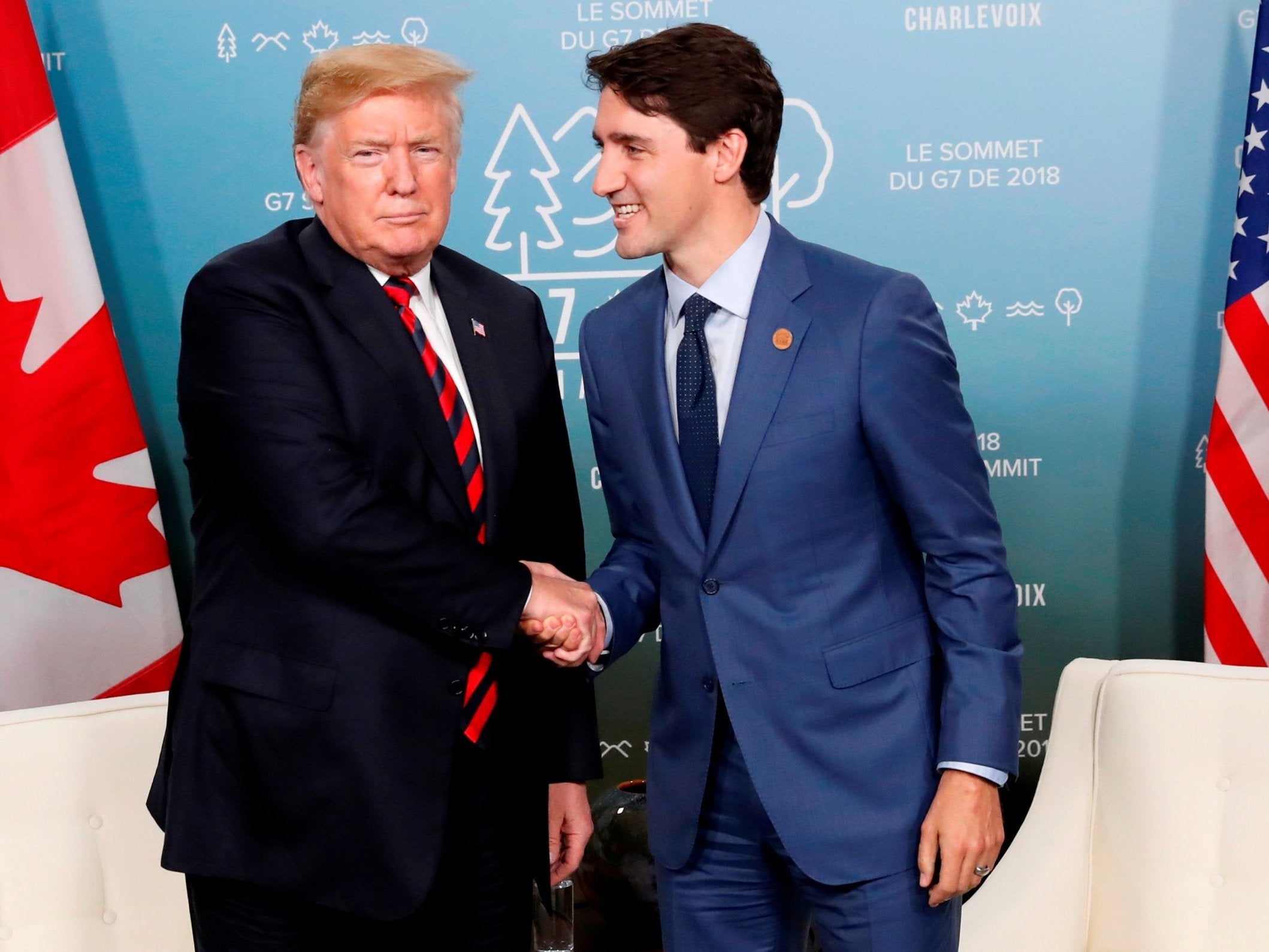US and Canada reach last-minute deal to replace Nafta with new trade agreement
New deal will be called the United States-Mexico-Canada Agreement, or USMCA

Your support helps us to tell the story
From reproductive rights to climate change to Big Tech, The Independent is on the ground when the story is developing. Whether it's investigating the financials of Elon Musk's pro-Trump PAC or producing our latest documentary, 'The A Word', which shines a light on the American women fighting for reproductive rights, we know how important it is to parse out the facts from the messaging.
At such a critical moment in US history, we need reporters on the ground. Your donation allows us to keep sending journalists to speak to both sides of the story.
The Independent is trusted by Americans across the entire political spectrum. And unlike many other quality news outlets, we choose not to lock Americans out of our reporting and analysis with paywalls. We believe quality journalism should be available to everyone, paid for by those who can afford it.
Your support makes all the difference.Canada and the US have reached a deal to resurrect a free trade agreement with Mexico, a replacement for the Nafta deal which Donald Trump had campaigned against and described as a job-killing disaster.
The deal was agreed just before midnight on Sunday, a deadline imposed by the US, and will be called the United States-Mexico-Canada Agreement, or USMCA.
Canadian and American officials said in a joint statement the agreement will "strengthen the middle class, and create good, well-paying jobs and new opportunities for the nearly half billion people who call North America home".
The agreement gives American farmers greater access to the Canadian dairy market - a key demand from the US side. But it also keeps a Nafta dispute resolution process that the US had wanted to get rid of, and offers Canada protection if Mr Trump goes ahead with plans to impose tariffs on cars, trucks and auto parts imported into the United States.
"It's a good day for Canada," prime minister Justin Trudeau said as he left his office. Mr Trudeau said he would have more to say Monday.
"We celebrate a trilateral deal. The door closes on trade fragmentation in the region," Jesus Seade, trade negotiator for Mexico's incoming president, said via Twitter.
Representatives for the government of Mexican president-elect Andres Manuel Lopez Obrador have called a press conference to discuss details of the trade deal on Monday.
Canada, the United States' No. 2 trading partner, was left out when the US and Mexico reached an agreement last month to revamp the North American Free Trade Agreement.
The Trump administration officially notified Congress of the US-Mexico trade agreement on 31 August. That started a 90-day clock that would let outgoing Mexican President Enrique Pena Nieto sign the new pact before he leaves office 1 December.
Mr Trump threatened to go ahead with a revamped Nafta — with or without Canada. It was unclear, however, whether Mr Trump had authority from Congress to pursue a revamped Nafta with only Mexico.
Some lawmakers immediately expressed relief that Canada had been reinstated in the regional trading bloc. "I am pleased that the Trump administration was able to strike a deal to modernize Nafta with both Mexico and Canada," said Senate Finance Chairman Orrin Hatch, R-Utah. "Nafta is a proven success."
Nafta tore down most trade barriers between the United States, Canada and Mexico, leading to a surge in trade between the three countries. But Mr Trump and other critics said it encouraged manufacturers to move south of the border to take advantage of low-wage Mexican wages, costing American jobs.
Mr Trump campaigned on a promise to rewrite Nafta — or get rid of it. Talks on a rewrite began more than a year ago. To placate Mr Trump, Mexico agreed in August to provisions that would require 40 percent to 45 percent of a car be built in countries where auto workers earn at least $16 an hour to qualify for Nafta's duty-free benefits.
It was surprising that the US found it easier to cut a deal with Mexico than with Canada, a longtime ally with a high-wage economy similar to America's. "When this got started, Canada was the teacher's pet and Mexico was the problem child," said Michael Camunez, president of Monarch Global Strategies and former US Commerce Department official.
But relations between Ottawa and Washington soured. In the aftermath of a disastrous G-7 summit in Quebec in June, Mr Trump called Mr Trudeau "weak" and "dishonest."
The two countries need each other economically. Canada is by far the No 1 destination for US exports, and the US market accounts for 75 percent of what Canada sells abroad.
Additional reporting by agencies
Join our commenting forum
Join thought-provoking conversations, follow other Independent readers and see their replies
Comments